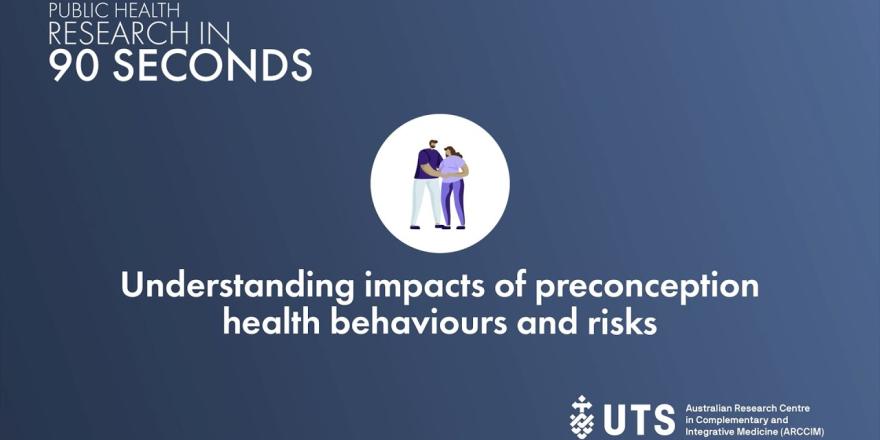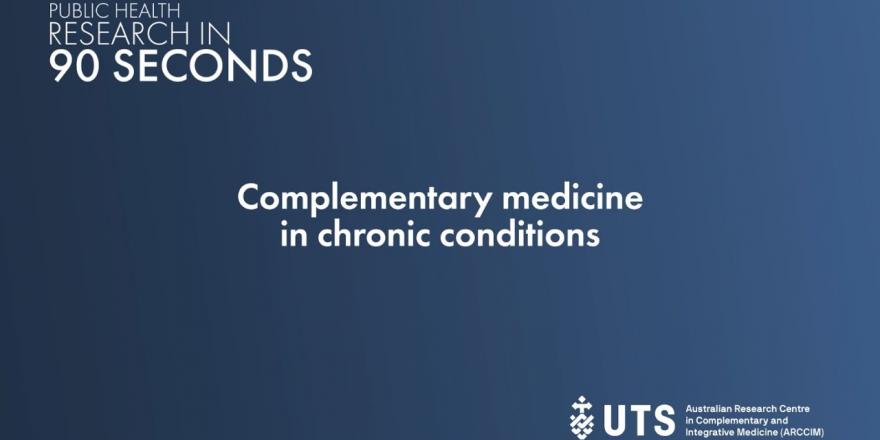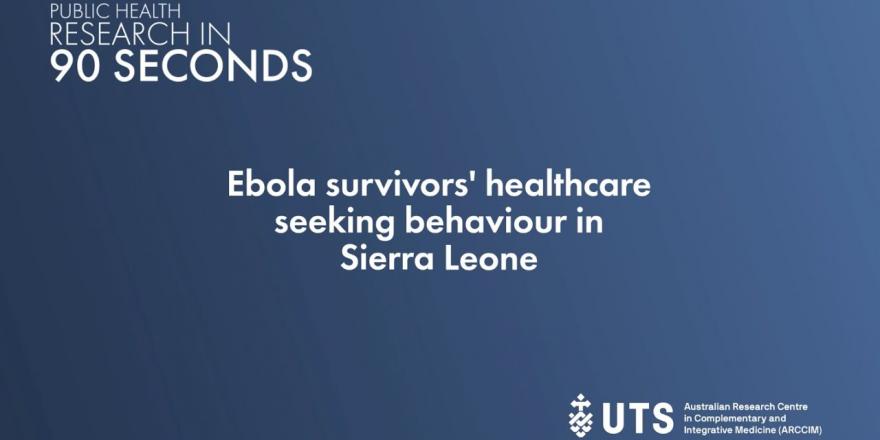We house the largest pool of PhD students (>30) focused upon topics and issues of significance and impact including TCIM and public health, global health and health systems/services challenges in the world.
Our PhD students are tackling topics spanning Traditional, Complimentary and Integrative Medicine and public health, global health and health systems/services challenges.
The ‘Research in 90 seconds’ series showcases a range research projects, what they’re about and how the research is relevant to broader communities.
Cherie Caut
Cherie Caut is a PhD Candidate within the Australian Research Centre in Complementary and Integrative Medicine (ARCCIM), School of Public Health, Faculty of Health at UTS. Cherie’s PhD is exploring the preconception health literacy, and beliefs and attitudes towards preconception care, of health professionals in Australia.
Understanding impacts of preconception health behaviours and risks
Our review explored the relationships between modifiable preconception risks/health behaviours and maternal/offspring health outcomes. The findings of 27 systematic reviews indicate that preconception body composition (e.g., underweight, overweight, obesity), lifestyle behaviours (e.g., caffeine, smoking, physical activity, alcohol, and illicit drugs), nutrition (e.g., micronutrients, Mediterranean diet), environmental exposures (air pollution, radiation, pesticides, chemicals, and metals), and birth spacing (e.g., short interpregnancy intervals) affect maternal/child health.
Preconception risks/health behaviours were found to affect embryo (e.g., miscarriage, embryonic growth), maternal (e.g., preeclampsia, gestational diabetes, post-natal depression), foetal/neonate (e.g., birth defects, preterm birth, low birth weight, small for gestational age, macrosomia, stillbirth) and child (e.g., neurocognitive disorders, childhood cancers, cerebral palsy, childhood overweight) health.
Publications
Caut C, Schoenaker D, McIntyre E, Vilcins D, Gavine A, Steel A. Relationships between Women's and Men's Modifiable Preconception Risks and Health Behaviors and Maternal and Offspring Health Outcomes: An Umbrella Review. Semin Reprod Med. 2022 Jul 13. doi: 10.1055/s-0042-1744257. Epub ahead of print. PMID: 35830867.
Read the article on:

Public Health Research in 90 Seconds
Understanding impacts of preconception health behaviours and risks
A parent’s health in the time before pregnancy – known as the preconception period – can impact the mother and the child during pregnancy, after birth, and later in the child’s life.
Despite extensive preconception health research no work had attempted to identify the most important health behaviours and risks.
Our research gathered evidence from 27 systematic reviews to provide a clearer picture of preconception health behaviours and risks in order to help inform couples’ choices before becoming pregnant.
Parental preconception health behaviours and risks that impact the pregnancy, health of the baby and the child’s health after birth
Female:
- Weight
- Diet
- Lifestyle
- Environment
- Time between pregnancies
Male:
- Weight
- Lifestyle
- Environment
Impacts of unhealthy preconception behaviours
- Pregnancy complication
- Foetal and infant health outcomes
- Fertility outcomes
- Maternal health outcomes
- Child health outcomes
Parental preconception behaviours can impact the couple and their baby in a variety of ways.
Any future parents and their health professionals need to be aware of the importance of weight, nutrition, lifestyle, environment and birth spacing for the best possible outcome for the whole family.
UTS: Australian Research Centre in Complementary and Integrative Medicine (ARCCIM)
To access the full research findings, visit ARCCIM via the UTS website
Hope Foley
Hope Foley has recently completed her PhD with ARCCIM and continues to work in research surrounding traditional, complementary and integrative medicine. Hope comes from a background in naturopathy and her work seeks to build bridges between health care traditions, science and contemporary practice to improve patient care holistically.
Complementary medicine in chronic conditions
Chronic health conditions can be challenging as they are complex, ongoing and can affect quality of life, leading any patients with chronic conditions to seek complementary medicine (CM) practitioners in the search for supportive, holistic, person-centred care. This study examined the perspectives of such patients to determine whether the care they receive from CM practitioners is indeed person-centred. Patients consistently reported high levels of person-centred care from their CM practitioners, with supportive approaches and open communication playing important roles in the experience. The findings suggest CM practitioners can provide highly valued services to patients with chronic conditions.
Publications
- Foley, H. Consultation and communication with complementary medicine practitioners by those with chronic health conditions: An analysis of population- and practice-based datasets. Cadi (Sydney): University of Technology Sydney; 2021
- Foley H, Steel A, Cramer, H, Wardle J & Adams J. Disclosure of complementary medicine use to medical providers: A systematic review and meta-analysis. Scientific Reports. 2019. 9:1 https://www.nature.com/articles/s41598-018-38279-8
- Foley H, Steel A, McIntyre E, Harnett J, Sibbritt D, Wardle J & Adams J. Complementary medicine practitioner consultations amongst 1,314 individuals with chronic conditions: Characteristics of users, reasons for and predictors of use. Complementary Therapies in Clinical Practice. 2020. 40:101194 https://doi.org/10.1016/j.ctcp.2020.101194
- Foley H, Steel A & Adams J. Consultation with complementary medicine practitioners by individuals with chronic conditions: Characteristics and reasons for consultation in Australian clinical settings. Health and Social Care in the Community. 2020. In press. https://onlinelibrary.wiley.com/doi/epdf/10.1111/hsc.13072
- Foley H, Steel A & Adams J. Perceptions of person-centred care amongst individuals with chronic conditions who consult complementary medicine practitioners. Complementary Therapies in Medicine. 2020. 52:102518 https://doi.org/10.1016/j.ctim.2020.102518

Public Health Research in 90 Seconds
Complementary medicine in chronic conditions
Chronic health conditions are long-term, complex and challenging for patients, health care providers and health systems. These patients often seek complementary medicine practitioners to help with their challenges.
To provide optimal care for patients with chronic conditions, we need to understand the experiences they have with complementary medicine practitioners.
This ARCCIM study found 38% of patients with chronic conditions consult complementary medicine practitioners in Australia.
The experiences these patients had with their complementary medicine practitioners were consistently positive, supportive and individualized to their needs – we call this “person-centred care”.
Person-centred care was reported by patients more often in complementary medicine consultations than in other health care settings.
Person-centred care is especially important to address the complex challenges of chronic conditions, suggesting that complementary medicine practitioners could be a valuable resource for these patients.
UTS: Australian Research Centre in Complementary and Integrative Medicine (ARCCIM)
To access the full research findings visit ARCCIM via the UTS website
Peter James
Dr Peter Bai James has a background in Pharmacy, ethnopharmacology and public health. He worked as an associate lecturer at the University of Sierra Leone and as a drug regulator at the Pharmacy Board of Sierra Leone.
Ebola survivors' healthcare seeking behaviour in Sierra Leone
Ebola survivors can have severe, long-lasting health complications. While research has focused on understanding the science behind the post-Ebola syndrome, there has been little attention on Ebola survivors’ experiences in managing their health problems. We examine the types of healthcare survivors are accessing, their experiences of seeking care and preferences. We found that Ebola survivors used government-funded services, pharmacies and traditional, complementary medicine (T&CM). Most survivors prefer to use conventional medicine, but this not always the case as a range of personal, cultural, psychosocial and health system factors influence their choice of healthcare, especially T&CM or selfcare.
Publications
- James PB, Wardle J, Steel A, Adams J. Traditional, complementary and alternative medicine use in Sub-Saharan Africa: a systematic review. BMJ global health. 2018 Oct 1;3(5):e000895. https://gh.bmj.com/content/3/5/e000895.full
- James PB, Wardle J, Steel A, Adams J. Post‐Ebola psychosocial experiences and coping mechanisms among Ebola survivors: a systematic review. Tropical Medicine & International Health. 2019 Jun;24(6):671-91. https://onlinelibrary.wiley.com/doi/full/10.1111/tmi.13226
- James PB, Wardle J, Steel A, Adams J. Pattern of health care utilisation and traditional and complementary medicine use among Ebola survivors in Sierra Leone. PloS one. 2019 Sep 27;14(9):e0223068. https://journals.plos.org/plosone/article?id=10.1371/journal.pone.0223068
- James PB, Wardle J, Steel A, Adams J. Utilisation of and Attitude towards Traditional and Complementary Medicine among Ebola Survivors in Sierra Leone. Medicina. 2019 Jul;55(7):387. https://www.mdpi.com/1010-660X/55/7/387
- James PB, Wardle J, Steel A, Adams J. An assessment of Ebola-related stigma and its association with informal healthcare utilisation among Ebola survivors in Sierra Leone: a cross-sectional study. BMC Public Health. 2020 Dec 1;20(1):182. https://bmcpublichealth.biomedcentral.com/articles/10.1186/s12889-020-8279-7
- James PB, Wardle J, Steel A, Adams J, Ebola survivors’ healthcare-seeking experiences and preferences of conventional, complementary and traditional medicine use: A qualitative exploratory study in Sierra Leone, Complementary Therapies in Clinical Practice. 2020 May;39, doi:https://doi.org/10.1016/j.ctcp.2020.101127 https://www.sciencedirect.com/science/article/pii/S174438811930859X
- James, PB., Wardle, J., Steel, A. & Adams, J. 2019, ‘The Need for Research on the Use of Traditional and Complementary Medicine in Emerging and Re-Emerging Infectious Diseases Outbreaks: Ebola as a Case Study, in J. Adams (ed.), Public Health and Health Services Research in Traditional, Complementary and Integrative Health Care: International Perspectives, World Scientific Publishing Europe Ltd, London, pp. 239-54. https://www.worldscientific.com/doi/abs/10.1142/9781786346797_0014
- James PB, Wardle J, Steel A, Adams J, Bah AJ, Sevalie S. Providing healthcare to Ebola survivors: A qualitative exploratory investigation of healthcare providers’ views and experiences in Sierra Leone. Global public health. 2020 Sep 1;15(9):1380-95. https://www.tandfonline.com/doi/full/10.1080/17441692.2020.1762105
- James PB, Wardle J, Steel A, Adams J, Bah AJ, Sevalie S. Traditional and complementary medicine use among Ebola survivors in Sierra Leone: a qualitative exploratory study of the perspectives of healthcare workers providing care to Ebola survivors. BMC complementary medicine and therapies. 2020 Dec;20:1-1. https://bmccomplementmedtherapies.biomedcentral.com/articles/10.1186/s12906-020-02931-6
- James PB. 2020. Healthcare utilisation and medical pluralism among Ebola survivors in Sierra Leone: an insight for safe and informed care for survivors experiencing post-Ebola sequelae (Doctoral dissertation). https://opus.lib.uts.edu.au/handle/10453/147365

Public Health Research in 90 Seconds
Ebola survivors’ healthcare seeking behavior in Sierra Leone
Ebola virus disease survivors can have a range of health complications, some of which can be severe and debilitating and last many years.
While research has focused on understanding the science of post-Ebola syndrome there has been little focus upon Ebola survivors’ experiences of living post-Ebola and trying to manage their condition.
So, we examined the types of health care Ebola survivors were accessing, their experiences of their condition and their healthcare, and their preferences for care in the future.
We found that Ebola survivors access all kinds of healthcare including government-funded services, pharmacies, and traditional and complementary medicine (T&CM).
86% visited any health professional
71% self-medicated with pharmaceuticals
39% visited a community pharmacy
30% self-medicated with T&CM products
17% used both T&CM products and pharmaceuticals
11% visited a T&CM practitioner
Most Ebola survivors would prefer to access conventional healthcare immediately following their discharge from the Ebola treatment centre.
But this is not always the reality and a range of personal, cultural, psychosocial and health system issues influence their choice of healthcare.
Ebola survivors are more likely to use T&CM or self-care options if they have experienced verbal abuse by healthcare providers or members of the community, or feel neglected by other types of healthcare.
They also use these health care options if they perceive their own health as poor, or are experiencing joint pain.
Ebola survivors experience complex ongoing symptoms in the face of a health system that fails to meet their needs as well as challenging community reactions to their post-Ebola status.
They experience stigma when seeking access to services and are often turning to T&CM practitioners and products for help.
To offer better support to Ebola survivors, we need to know more about what these options are, if they are safe and effective, and what else can be done to improve life after Ebola.
UTS: Australian Research Centre in Complementary and Integrative Medicine (ARCCIM)
To access the full research findings visit ARCCIM via the UTS website

